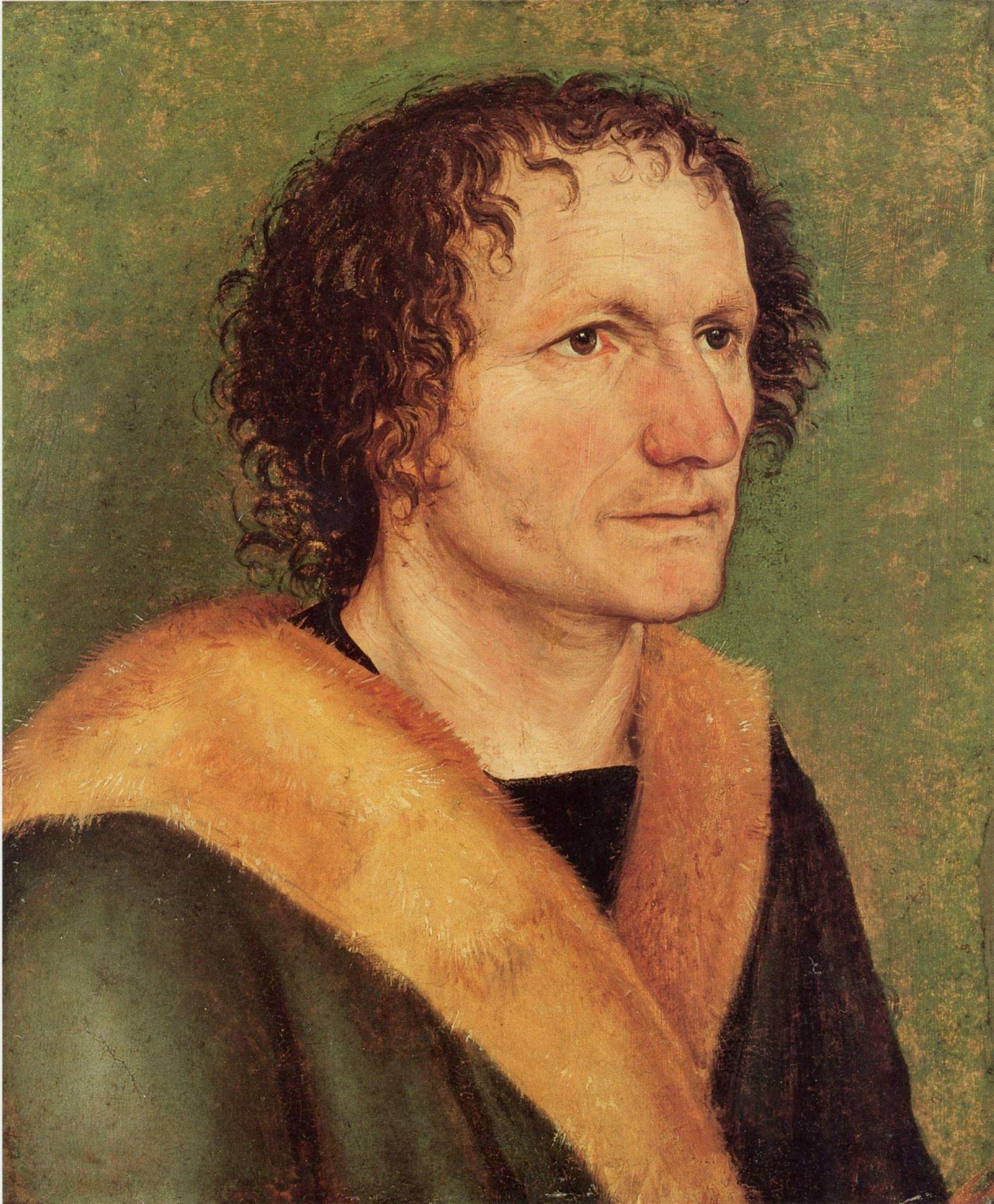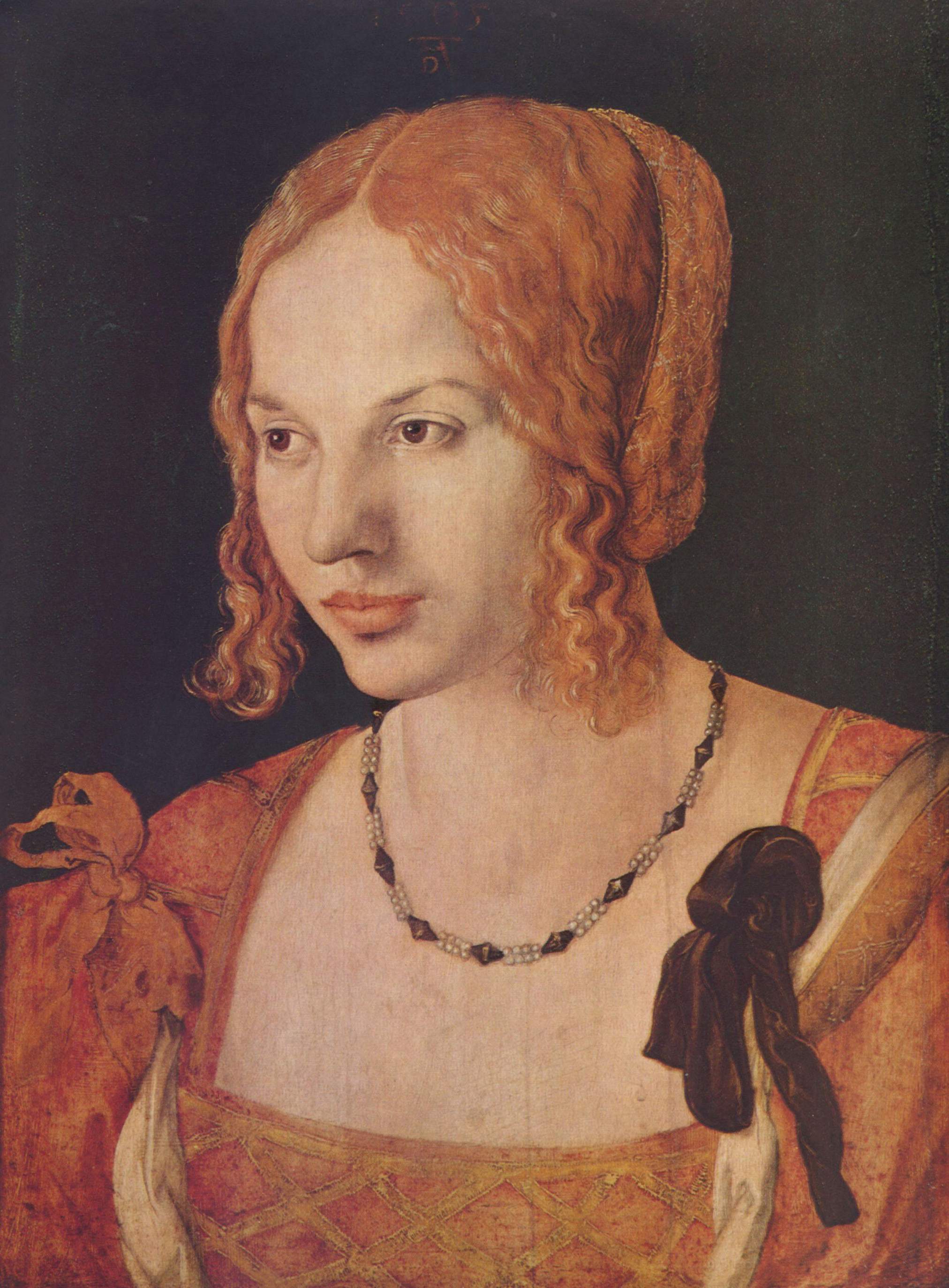 |
| Receding hair line? Albrecht Dürer, Male* |
Were Albrecht Dürer's models happy with their looks? Did the guy in green fret about his receding hair line? Did he find his nose too large? Did the Venetian woman long for a more prominent chin? If the two lived today: would they opt for plastic surgery?
Simultaneous exhibitions on two continents inspired me to think about faces, honesty, beauty, and ideals; about how we deal with what is different - in us and in others. The one show, Dürer, Cranbach, Holbein - The German Portrait Around 1500, is on view at the Kunsthistorisches Museum in Vienna and will later travel to Munich; the other, Beautyculture, opened at the Annenberg Space for Photography in Los Angeles in May.
I saw the portrait exhibition a few weeks ago, during a visit to Vienna, and was especially taken with Dürer's art, with the honesty in his paintings. Studying the (European) faces of Dürer's subjects, their features, the lines around their eyes, their serious, forlorn expressions I felt connected to these men and women. It struck me: clothes and hair styles may have changed through the centuries but our faces have not. Now as then they reveal our humanity like nothing else.
Well, last Sunday, at the photography exhibition in L.A. I was forced to reconsider. The show deals with various aspects of beauty: with makeup, models, and color (as in race); with Hollywood glamour, androgyny, and size (as in Twiggy vs. big breasts). What got me thinking most was a 15 or 20 minute documentary on cosmetic surgery, were the many images of blown up lips and surprised eyes, the interviews with silicon implanted and tummy tucked women of all ages, their agonizing about wrinkles, butts, and breasts.
500 years after Duerer mankind has managed to create a new type of human: the artificially enhanced (?) man, the technically altered woman, a being which is part nature, part artificial product, not quite Frankenstein's monster but almost. We can opt for breasts in all sizes, get to pick chins and cheeks from catalogs. (Did you know that Claudia Schiffer's nose is the most requested template in Italy?) We can eliminate every wrinkle from our faces, get rid of the pregnancy related flap of loose skin on our bellies. We can create ourselves in our own image, play God.
Questions abound. Why do we cling to (changing) ideals of beauty rather than seeing the beauty in that which makes us different or unique? How come everybody wants to look the same? Do we really think that death will spare us if we erase our wrinkles and inflate our thinning lips? Last but not least: whatever happened to embracing nature, to accepting life, to humility?
Sometimes I worry. If we cannot learn to live with what we see as flaws in ourselves, if we cannot integrate those aspects of us which set us apart from the local mainstream or ideal - how will we ever learn to reconcile with what is different in others, in our society? How will we learn to embrace people of other races or from different religions? The handicapped? The blind? People with life styles or opinions we can't identify with? If we get used to killing every otherness in ourselves - how will we learn not to kill other people just because they are different. Put otherwise: how will we prevent the next murder, massacre, or genocide in the name of whatever?
What, When, Where:I saw the portrait exhibition a few weeks ago, during a visit to Vienna, and was especially taken with Dürer's art, with the honesty in his paintings. Studying the (European) faces of Dürer's subjects, their features, the lines around their eyes, their serious, forlorn expressions I felt connected to these men and women. It struck me: clothes and hair styles may have changed through the centuries but our faces have not. Now as then they reveal our humanity like nothing else.
Well, last Sunday, at the photography exhibition in L.A. I was forced to reconsider. The show deals with various aspects of beauty: with makeup, models, and color (as in race); with Hollywood glamour, androgyny, and size (as in Twiggy vs. big breasts). What got me thinking most was a 15 or 20 minute documentary on cosmetic surgery, were the many images of blown up lips and surprised eyes, the interviews with silicon implanted and tummy tucked women of all ages, their agonizing about wrinkles, butts, and breasts.
500 years after Duerer mankind has managed to create a new type of human: the artificially enhanced (?) man, the technically altered woman, a being which is part nature, part artificial product, not quite Frankenstein's monster but almost. We can opt for breasts in all sizes, get to pick chins and cheeks from catalogs. (Did you know that Claudia Schiffer's nose is the most requested template in Italy?) We can eliminate every wrinkle from our faces, get rid of the pregnancy related flap of loose skin on our bellies. We can create ourselves in our own image, play God.
Questions abound. Why do we cling to (changing) ideals of beauty rather than seeing the beauty in that which makes us different or unique? How come everybody wants to look the same? Do we really think that death will spare us if we erase our wrinkles and inflate our thinning lips? Last but not least: whatever happened to embracing nature, to accepting life, to humility?
Sometimes I worry. If we cannot learn to live with what we see as flaws in ourselves, if we cannot integrate those aspects of us which set us apart from the local mainstream or ideal - how will we ever learn to reconcile with what is different in others, in our society? How will we learn to embrace people of other races or from different religions? The handicapped? The blind? People with life styles or opinions we can't identify with? If we get used to killing every otherness in ourselves - how will we learn not to kill other people just because they are different. Put otherwise: how will we prevent the next murder, massacre, or genocide in the name of whatever?
- Dürer, Cranbach, Holbein - The German Portrait Around 1500
Until September 4, 2011
and
September 16, 2011 to January 15, 2012
- Beautyculture
Until November 27, 2011
- - -
* Both Dürer portraits are in the public domain. Thanks to Wikimedia Commons for providing the link.


Comments
I love your thoughts. Thank you for sharing them. You are so right in all of it, but I especially like, "How come everybody wants to look the same?" It's a mystery to me.
There's a gentleman that comes into our wood shop who has the most fascinating face. He's not pretty in any way; he's lived a hard life by the looks - but I want so much to take out my camera and preserve that unique face forever. That, to me, is what I would rather look at.
For me too, it's the faces that show signs of a life lived that I enjoy looking at most. Magazines like National Geographic are full of them - but their articles are usually about faraway places...
I’ve finally caught up with all your latest posts tonight. Sorry for being absent for a while. My performance practice had taken up too much time that I’m glad it’s now over:)
I really miss reading all of your articles where you share fascinating thoughts on such a broad range of topics. I particular enjoyed this one. It’s so easy to forget that God has made each of us unique when we accept the standard of beauty set by the mainstream society. I'm glad that you raised some thought-provoking observations and questions here.
In the context of Debi's comment above I was actually thinking of Capturing Penang, your blog, and of some of the weathered faces I remember seeing there. Can you imagine the street vendors of Penang with frozen, wrinkle-free, TV anchor style faces?
Just last week when we were rehearsing for the performance, one Chinese lady in her 90s walking down the street and paused to watch us. She was dressed in the traditional Chinese costume with her silvery grey hair braided. She seemed a bit out of place. Looking back at her, it feels like I was being transported back into 1930s for that moment.